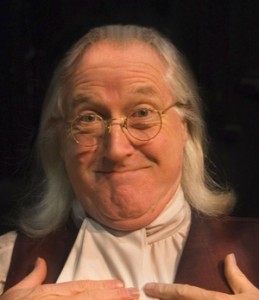Benjamin Franklin’s deism emerges, surprisingly, out of a semi-traditional belief system. In Autobiography, he situates his own religious principles by comparing them to the Presbyterian belief system. He denies “some of the Dogmas of that Persuasion,” but upholds what he perceives to be the “Essentials of every religion” (82) – those being divine creation, the golden rule, the eternal soul, and justice. So, although his deistic claims may, at first glance, seem quite distant from the Puritan past, Franklin maintains an ideological core with Puritan roots. Interestingly, the points that he rejects seem to involve the issues of human depravity and damning laws and divine decisions. In this way, Franklin rejects the less “pleasant” pieces of religious construction, while holding onto the ones he finds to be reasonably encouraging. From here, readers may ask how this picking and choosing is reflected in other parts of Franklin’s writings. In Wednesday’s class, the lack of emotional depth in the narrative surfaced as a discussion point. Could Franklin be picking and choosing uplifting pieces of both religion and himself to reinforce in his narrative? Perhaps his negative, or unruly, emotions are omitted for the same reason he omits such traditional church doctrine, as he says that it “appear’d to me unintelligible” (82). This is an interesting possibility for two reasons. Firstly, it suggests an unreliable character of Franklin because he is selectively choosing to disclose certain information in order to manipulate the audience’s perception; secondly, it suggests that Franklin’s religious/social beliefs are not so progressive. If they are to be viewed as reflections of his self-serving habits in self-telling, then it is not grounded to sever him from the religious past from which he emerges. Rather, his deistic views may function in a way to strategically align himself with reason, because this is the rational character he seeks to construct. At the same time, however, he does not deny the significance of all religiosity, and since he is a self-proclaimed man of pride, perhaps this is an attempt at appearing to have virtue.
from the Puritan past, Franklin maintains an ideological core with Puritan roots. Interestingly, the points that he rejects seem to involve the issues of human depravity and damning laws and divine decisions. In this way, Franklin rejects the less “pleasant” pieces of religious construction, while holding onto the ones he finds to be reasonably encouraging. From here, readers may ask how this picking and choosing is reflected in other parts of Franklin’s writings. In Wednesday’s class, the lack of emotional depth in the narrative surfaced as a discussion point. Could Franklin be picking and choosing uplifting pieces of both religion and himself to reinforce in his narrative? Perhaps his negative, or unruly, emotions are omitted for the same reason he omits such traditional church doctrine, as he says that it “appear’d to me unintelligible” (82). This is an interesting possibility for two reasons. Firstly, it suggests an unreliable character of Franklin because he is selectively choosing to disclose certain information in order to manipulate the audience’s perception; secondly, it suggests that Franklin’s religious/social beliefs are not so progressive. If they are to be viewed as reflections of his self-serving habits in self-telling, then it is not grounded to sever him from the religious past from which he emerges. Rather, his deistic views may function in a way to strategically align himself with reason, because this is the rational character he seeks to construct. At the same time, however, he does not deny the significance of all religiosity, and since he is a self-proclaimed man of pride, perhaps this is an attempt at appearing to have virtue.
-
SIGN IN BELOW
Group Blogs
-
Tag Cloud
- "Tool Kit"
- 20% project
- Alison Bechdel
- Anne Bradstreet
- audience
- authenticity
- Autobiographical Truth
- Autobiography
- Benjamin Franklin
- Cabeza de Vaca
- character sketch
- Claudia Rankine
- coaxers
- coercers
- Comic
- Confession
- Don't Let Me Be Lonely
- Embodiment
- ethics
- Experience
- Fun Home
- Giralamo Cardano
- Gurdwara
- identity
- Ideological I
- Knowledge
- Memory
- Naming
- Narrative
- parental influences
- Puritan
- puritanism
- Puritans
- Reading Autobiography
- relationality
- religion
- Religious Ideologies & Disasters
- Self
- Sherman Alexie
- Sikh
- Smith and Watson
- Spiritual Autobiography
- storytelling
- The Unauthorized Autobiography of Me
- Voice
-
Recent Posts

